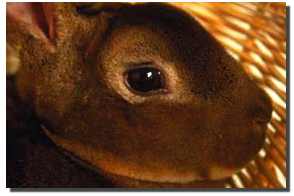 |
|
|
Back To Top Back To Top Back To Top Back To Top Back To Top |
|
Pet Care Rabbit Care :Rabbits are in many ways ideal pets for children: they are fairly large, very docile and easy to handle. Rabbits are best bought when nine to tweleve weeks old from reputable breeders. If possible buy two females to provide each other with companionship. Males when they mature must be housed individually. Choose only active healthy rabbits, note the diet and if you need to change it, do so only gradually. Rabbits can live up to tweleve years old but generally live to four or five. Accommodation - HutchesRabbits need dry, warm, spacious and well ventialted living quarters, with similarly confortable sleeping quarters attached. Indoor hutches are best placed in a well-ventilated but not draughty outhouse, in a place where rats and mice cannot reach them. Outdoor hutches should be in a sheltered location , facing the mildest weather and away from direct sunlight. Throughout the hutch spread a 5cm layer of wood shavings, wood chippings or peatmoss litter, covered in the sleeping quarters with a liberal quantity of fresh, clean, dust-free hay. Provide a bark-covered log in the living quarters as a gnawing block, to keep the teeth in trim. DietProper feeding of your rabbit is essential. A few greens and a crust will not suffice. Greens must be well washed in cold water, shaken and allowed to dry. Too much green food leads to diarrhoea. Lawn clippings or frozen greens must never be fed to your pet. Evryday provide a liberal amount of fresh hay together with a protein rich morning meal and green-food evening meal. All mealtimes should be at regular times.
Routine CareOrderly care is essential for the health of your rabbits. In the morning, clean out the water and feed bowls and provide fresh water, feeding hay, milk and the morning meal. See that your rabbits are healthy and eating well. Every second day sweep the hutch out thoroughly, and put in fresh floor litter and bedding. Twice a week, scrub the hutch with hot water mixed with detergent and allow to dry before replacing with fresh materials. Groom your rabbits fur once a week with a babys hairbrush. Rabbits need to feel secure when handled so do this gently but firmly. Never lift a rabbit by the ears nor under the belly without supporting the hindquarters. Rabbits should be removed from and placed in hutches with the head facing into the hutch. ExerciseDaily exercise outside the hutch is essential so long as the weather is good. If your rabbits are allowed to run free you need to supervise them and stay alert. An outdoor run can be constructed for your rabbits and this should be moved frequently during the day to new grazing areas. HealthIllness can usually be traced to inadequate food and care. As rabbit illnesses are difficult to diagnose and occasionally strike quickly, it is essential to obtain veterinary advice at the earliest opportunity. Never attempt home cures for your rabbit. If anything seems wrong with your rabbit contact a veterinary surgeon for immediate advice.  To Pet Care Section To Pet Care Section |
|
|
|